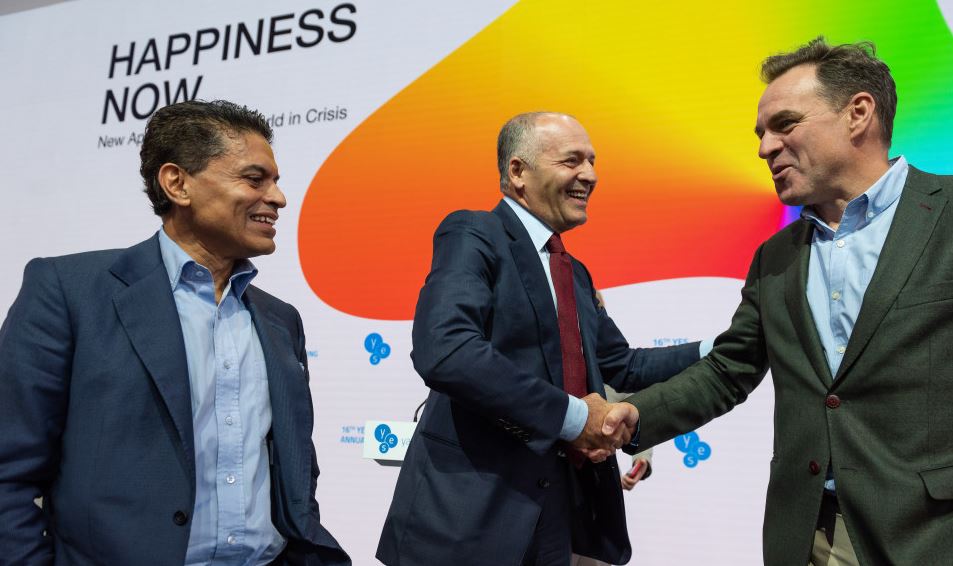Among many surprises was the presentation of the World Happiness Report, a survey conducted specially for the forum. According to the research, Ukrainians are the most optimistic nation in the world. At the same time, Ukrainians are the only nation identifying the “happiness of their children” as the most important factor for their own happiness. Why so?
Why should we talk about happiness as a political issue? Victor Pinchuk answers in his opening speech.
The annual YES forum is funded by Ukrainian billionaire Victor Pinchuk. Originally located in the city of Yalta in Crimea, since the 2014 Russian occupation it has been held in Kyiv.

According to Victor Pinchuk’s opening address, happiness has become a political issue in the modern world, more important than economic wealth. Once a society reaches relative security and prosperity, people start to demand happiness from their governments, and happiness becomes an important public issue.
Pinchuk presented the World Happiness sociological research
that he commissioned specifically for this forum. The research was conducted in 15 countries, collectively holding 52% of the world’s population. A key issue revealed in the survey was that 85.4% of respondents worldwide expect their governments to play an active role in enhancing the happiness of their citizens.
Victor Pinchuk emphasized that this desire for happiness is the main trigger of contemporary populism. People are no more satisfied with professional governments that consider wealth as the main goal. Something different, more down-to-earth, is required from politics. And populism often resonates with such demands.
Historian Niall Ferguson, among others, said that expecting happiness from the state is a bad and even dangerous idea. If the authorities want to make people happier, the result can only lead to misery.
Ferguson cautioned that the pursuit of happiness as a state policy leads to subjugation, referencing the prophetic novels of Yevgeny Zamyatin, We and Aldous Huxley, Brave New World. He believes that as soon as you expect happiness from the state, you lose your freedom. You can only find happiness by finding the meaning of your life. Freedom is a prerequisite of happiness. The mission of the state is not to make people happy, but to create the conditions under which they can make themselves happy.
What different nations consider important for happiness

The main question of the research was “What is important for your happiness?” and answers to the question varied significantly among countries.
For some countries, such as India, simply being happy is the most important; for some, such as Germany, health is the leading factor of happiness; for South Africa, financial security is the most important. Among all, there was one unique country where the strongest factor for happiness is “My children are happy.” That country is Ukraine.
Wanting happiness for their children reflects another dynamic in Ukraine – currently, Ukrainians are among the least happy nations. The hope that “our children will be happier” means that the majority of Ukrainians don’t really hope for happiness for themselves. It would be enough if their children were happy. This sentiment arises from the Soviet and post-Soviet (1990s) traumatic experiences when the main impetus for survival was the hope that your children would have a better life.
Alongside this finding is the positive side. Ukrainians are the most optimistic regarding the next five years -- among all countries surveyed.
- Read also: Majority of Ukrainians optimistic about country’s politics for first time in country’s history

“In the next five years, do you believe people in your country will be …?” Source: World Happiness sociological research
Such optimism is clearly linked to the landslide victory of President Zelenskyy’s team in the recent elections. No one can say how long this optimism will last, but it may prove to be a good trigger for change. Prime Minister Honcharuk’s speech was inspiring to many. He stressed that the new generation is now holding all major offices, and that the new government aims to rapidly implement the changes that were left unfinished by previous governments.
- Read also: Zelenskyy’s team unusually hard on Russia, outlines rapid economic reforms at YES conference

